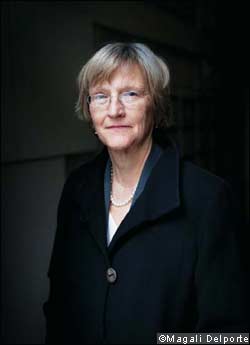我在弗吉尼亚州雪伦多亚河谷(Shenandoah Valley)的一个农场长大,在家里的四个孩子中排行老二,也是唯一的女儿。我母亲没上过大学,她期望我能“女承母业”。从小到大,妈妈一直想把我培养成一个贤妻良母。
小时候,“淑女”这个词意味深长——它意味着女孩子要温文尔雅、安分守己。我受到的限制比哥哥弟弟们多。每当我受邀到别人家过周末,妈妈总坚持她也得同去,以便确保我处于恰当的监督之下。记得自己十几岁的时候有一次顶撞了妈妈,原因是我哥哥晚上还开车出去,而妈妈却从不允许我开车。她总是对我说:“宝贝儿,这是一个男人的世界,你越早明白这一点,将来的日子就会过得越幸福。”
我自己这种不公平的感受,逐渐在内心里演变成对于家庭之外种种不平之事的强烈不满。我从小生活在一个严格施行种族隔离制度的社区,白人和黑人有各自不同的学校,餐馆与其它公共设施也仅对白人开放。在我家里,黑人厨师和杂佣有他们自己的卫生间。当我明白所在学校没有黑人小朋友的原因后,给时任美国总统艾森豪威尔(President Eisenhower)写了一封信。 “我今年9岁,”我写道,“我是一个白人,但对于种族隔离有很多想法。”多年之后,我在艾森豪威尔博物馆里找到了当年这封信。
我学习成绩很好,虽然妈妈限制我在某些方面的自由,但她的确觉得我应该接受教育。所以1960年我13岁的时候,被送往马萨诸塞州康科德学院(Concord Academy),这是平生第一次我离家独立生活。家里同意我独自前往波士顿,我可以去听音乐会或是参观博物馆。同时,我在学业中既受到了鼓舞,也遭遇过挑战,发现教育能帮助自己实现人生志向。于是我继续求学,在1968年获得了布林莫尔学院(Bryn Mawr College)历史学学位,接着又获得了宾夕法尼亚大学(University of Pennsylvania)美洲文明专业的博士学位,并留校担任了助教。再后来,我出任拉德克里夫高等研究院(Radcliffe Institute for Advanced Study)首任正式院长,该院前身是附属于哈佛大学(Harvard University)的女子学院。
自己生活中所发生的变化,总是超乎我的想象。我从未想到过自己会获得博士学位、成为教授、并著书立传。即便是在2007年,得知自己荣升哈佛大学校长的那个清晨,我仍然有一种难以置信的感觉。(当我20岁的时候,女生是禁止进入哈佛大学本科生图书馆的。)担任校长后,我收到了全世界许多年轻女性的来信,说我的成功让她们觉得自己也能胜任任何事情。这真是感人至深。
我也收到了许多父亲的来信,他们对于我的任命感到由衷地高兴,因为他们知道,这一切对于自己的女儿来说意味着什么。
人们常说,教育是21世纪事关公民权利的大事。我作为哈佛校长,非常重要的一项工作就是财政救助计划。我希望能够确保给尽可能多有才华的人机会,营造一种兼容并包的文化。
对于妈妈会如何看待我现在的生活,我想了很多很多。她在我19岁那年就去世了。我想,如果真有机会的话,我会这样对她说:“妈妈,你瞧,如今这个世界不再只属于男人。”我想,即使我当初没有听从她的建议,她也会为我感到自豪。
译者/常和
http://www.ftchinese.com/story/001036167

I was brought up on a farm in Virginia, in the Shenandoah Valley, the second of four children and the only daughter. My mother never went to college and the expectation was that I would have a similar life. I was raised to become a wife and mother.
The word “lady” was a big word in my childhood – “lady” meant being gentle and submissive. I was restricted in ways my brothers weren’t. If I was invited to someone’s home to spend a weekend, my mother would insist that she, too, had an invitation so she could ensure I had appropriate supervision. I remember having one teenage confrontation with my mother because my older brother was out driving at night but I was never allowed to drive myself. She used to say to me: “It’s a man’s world, sweetie, and the sooner you figure it out, the happier you will be.”
My own sense of injustice developed within me an intense sense of the injustices happening outside my home. I lived in a community of rigid racial segregation. There were separate black and white schools; restaurants and other public facilities were restricted to whites, and in our house, the black cook and handyman had a separate bathroom. When I realised why there were no black children in my school, I sent a letter to President Eisenhower. “I am nine years old,” I wrote, “and I am white, but I have many feelings about segregation.” Years later I found out that my letter is in the Eisenhower museum.
I was good at school, and despite my mother’s resistance to certain freedoms, she did believe that I should be given educational opportunities. So at 13 I was sent to Concord Academy in Massachusetts. It was 1960, and for the first time I was living independently from my family. I was allowed to go into Boston on my own. I could go to a concert or visit the museums. Also, I was encouraged and challenged intellectually, and I found education very fulfilling. I went on to get a degree in history from Bryn Mawr College in 1968 and a PhD in American civilisation from the University of Pennsylvania, where I joined the faculty as an assistant professor. Later, I became the founding dean of the Radcliffe Institute for Advanced Study, a former women’s college that had been attached to Harvard University.
I am always surprised by how my life has turned out. I never would have imagined I’d get a PhD, or become a professor, or write books. Even in 2007, on the morning it was likely I was about to be promoted to president of Harvard, I had a feeling of disbelief. (When I was 20, women were not allowed into the Harvard undergraduate library.) When I was appointed, I had many letters from young women all over the world, telling me that it made them feel as though they could do anything. It was amazingly touching.
I also had letters from fathers telling me they were so happy about my appointment because of what it meant for their daughters’ lives.
It’s often said that education is the civil rights issue of the 21st century. And an extremely important aspect of my role at Harvard is the financial aid programme. I want to ensure that we give opportunities to as many talented people as we can, to foster a culture of inclusion.
I think a lot about what my mother would make of my life now. She died when I was 19. I guess if I could speak to her I would say, “Mummy, you see, it isn’t a man’s world any more.” I think she’d be pleased with me, even if I didn’t take her advice.
..................................................
没有评论:
发表评论